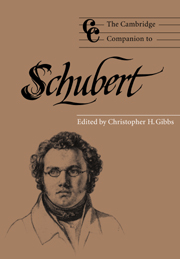Book contents
- Frontmatter
- Introduction: the elusive schubert
- Part I Contexts: musical, political, and cultural
- Part II Schuberts music: style and genre
- Part III Reception
- 13 German reception: Schubert's “journey to immortality”
- 14 Schubert's reception history in nineteenth-century England
- 15 Schubert's reception in France: a chronology (1828–1928)
- 16 Franz Schubert's music in performance: a brief history of people, events, and issues
- Notes
- Index
13 - German reception: Schubert's “journey to immortality”
from Part III - Reception
Published online by Cambridge University Press: 28 September 2011
- Frontmatter
- Introduction: the elusive schubert
- Part I Contexts: musical, political, and cultural
- Part II Schuberts music: style and genre
- Part III Reception
- 13 German reception: Schubert's “journey to immortality”
- 14 Schubert's reception history in nineteenth-century England
- 15 Schubert's reception in France: a chronology (1828–1928)
- 16 Franz Schubert's music in performance: a brief history of people, events, and issues
- Notes
- Index
Summary
Leopold von Sonnleithner, an early and ardent champion of Franz Schubert, remarked in 1857: “Without any doubt the description of how his compositions gradually gained recognition must also find a place in Schubert's biography; but this requires laborious study” (SMF 119). Robert Schumann had already sounded a similar theme nearly two decades earlier, warning that “he who is not yet acquainted with [the “Great” C Major] Symphony knows very little about Schubert.” Unpublished compositions should be immediately released, Schumann urged, so that “the world finally arrives at the full appreciation of Schubert” (SMF 405). The lack of a truly representative selection of Schubert's music prompted his biographer Heinrich Kreissle von Hellborn to write in 1865 that
Schubert in his totality is only known and appreciated by a few. There are vocal works of all kinds, cantatas, overtures, orchestral, opera, and church music, of which until now not a single note has ever been heard. For forty years and more this music has remained unused, in some cases mere objects of painful solicitude, as though the composer had written his enchanting music only for himself, and not for ourselves and our children.
These three concurring views of Schubert's problematic reception, expressed by his friend Sonnleithner, by his most passionate and articulate critical advocate, and by his first biographer, all point to the unusual difficulties caused by the posthumous release of so many extraordinary pieces. To borrow the phrase of another acquaintance, Josef Kenner, Schubert's “journey to immortality” encountered significant obstacles and detours (SMF 82). The history of Schubert's musical reception is thus largely the story of the gradual dissemination and increasing appreciation of his compositions.
- Type
- Chapter
- Information
- The Cambridge Companion to Schubert , pp. 239 - 253Publisher: Cambridge University PressPrint publication year: 1997
- 1
- Cited by

